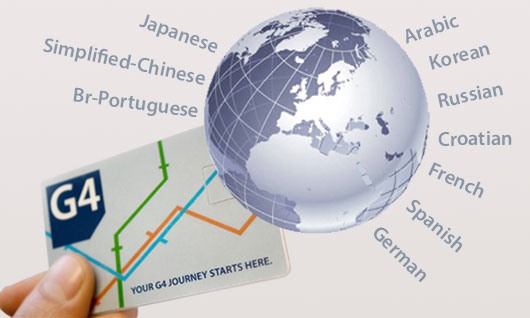
Last December, GRI announced the publication of the first four G4 translations (German, Spanish, Brazilian-Portuguese and French). Since then, the Guidelines have been made available in a further six languages: Russian, Arabic, Japanese, Simplified-Chinese, Korean, and Croatian. This article takes a look at the G4 translation process and covers some frequently asked questions.Page Content
What determines which languages the Guidelines are translated into?
There is a combination of factors determining which languages the Guidelines are translated into. First and foremost, demand. Second, is it a priority language? This is a decision based on the number of speakers and the positive impact the translation will have. Third, is it possible to peer review the translation in question in order to maintain the highest standards in terms of the ease of use and whether it is faithful to the original English-language version? Finally, is it possible to fund the cost of creating the translation in question?
How are the translations financed?
To cover the translation agency costs, GRI seeks the support of organizations to help with financial sponsorship. The investment required to cover the cost of each translation ranges between €15,000 and €20,000 – depending on the language. GRI features the names and logos of sponsors on the acknowledgements page of the translated document, and in launch communications. For more information about the visibility and commitment of sponsors, view a sample version of the Letter of Agreement for G4 translation sponsors.
GRI’s Secretariat is based in the Netherlands; why is there no Dutch translation yet?
Nearly all Dutch people are fluent in English, especially those who work in business and in the sustainability sector. This is equally true for a number of other European nations such as Denmark, Sweden and Norway, which is why the demand has not yet arisen for the Guidelines to be translated into any of these languages either. If sponsorship becomes available though, GRI will of course endeavor to produce these translations.
Why ‘simplified’ Chinese?
While Mandarin (Simplified) Chinese is spoken in both China and Taiwan, the characters used for writing are different. Interest in sustainability reporting in China’s island neighbor has grown considerably in recent years and the decision was therefore taken to cater specifically for the Taiwanese market by producing a separate ‘Traditional’ Chinese language translation, which will be available in the next few months.
Chinese and English are very different languages? Is this a problem when translating such a technical document?
The simple answer is yes, it is challenging – but not just with Chinese. The terms used by GRI and the wider reporting and CSR professions often have no direct translation in other languages. This is a challenge even for GRI staff, many of whom use English words when talking about G4 in their own languages.
How many more translations are planned?
There are currently four more translations underway. These are: Bahasa-Indonesian, Traditional Chinese, Turkish and Vietnamese, which are all set to be published within the coming three months.
GRI is now also looking for sponsorship for the translation of G4 into Greek, Italian and Polish. An amount of €15,000 per language needs to be secured – this amount can potentially be shared among a maximum of five sponsors per language and will be used to cover the translation agency costs. If you wish to support the GRI G4 translations program by sponsoring one of these languages, please send your details, in English, to translations@globalreporting.org. Please state clearly which language you are willing to support.
Commenting on the importance and value of G4 translations, Jörg Trautner, Head of CSR at the German Federal Ministry of Labor and Social Affairs, one of the sponsors of the German translation, said: “The German Federal Ministry of Labor and Social Affairs (BMAS) highly endorses the translation of the new G4 Guidelines on sustainability reporting into other languages. The GRI Guidelines enable organizations to report the sustainability information that matters. In light of the European Commission’s current CSR definition, which emphasizes the social impact of business activities, it is important that the new G4 Guidelines place the emphasis on what is material. This encourages organizations to provide only information that is critical to their business and stakeholders. BMAS supports this process.”
To read more about the G4 translations program, and to download the translations currently available, follow this link.
- CBCSD and Members Participated and Suggested on the Project for Technical Regulation on Low-carbon Pilot Community
- CBCSD and Members Participated in the APEC Cooperation Network Construction Forum of Green Supply Chain
- Calculation Method of CO2 Emissions in Petroleum and Natural Gas Exploitation Enterprises & Calculation Method of CO2 Emissions in Water Network of Chemical Enterprises
- CBCSD Attended the Workshop for Environmental Protection and Sustainable Development and Delivered Introductions
- WBCSD: Tackling the Challenge, How to Make Informed Choices on Forest Product?
- The National New-Type Urbanization Plan Released, Board Members of CBCSD Help the Sustainable Development of Cities
- Board members of CBCSD Actively Participated in the Carbon Trading and International Climate Change Process
- Two industrial Standards Compiled by CBCSD Passed Examination
- Widespread Use of the Achievements Businesses Energy Saving and Greenhouse Gas Management
- CBCSD held Chemical industry enterprise value chain (range 3) greenhouse gas emissions, accounting and reporting guidelines

